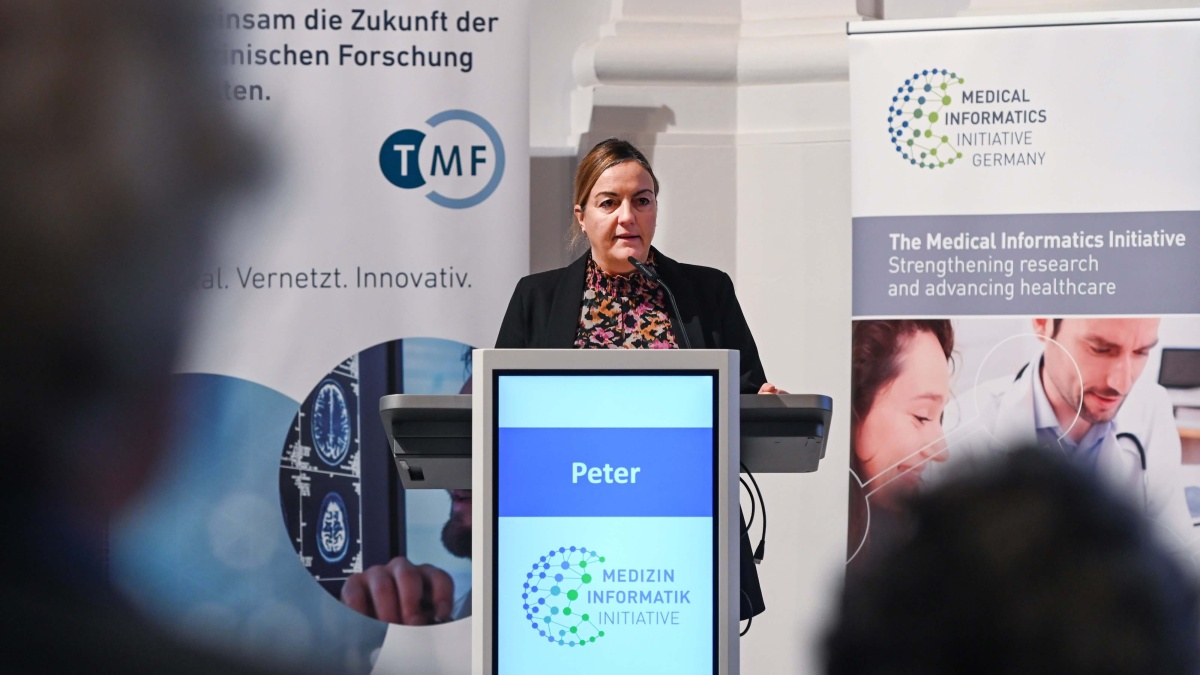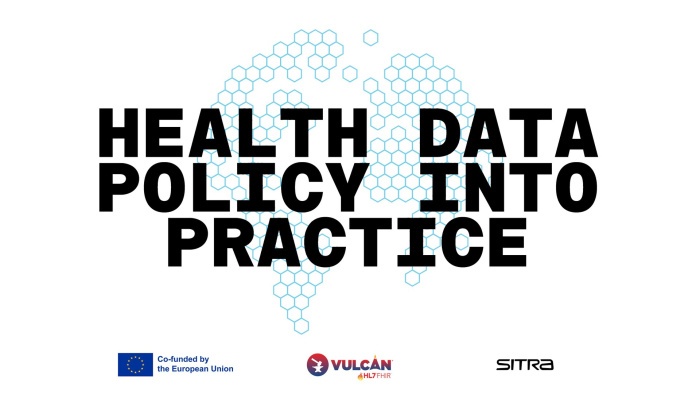Digitalization of Health Research: Data Infrastructure Successfully Tested

Katharina Peter, Head of the Subdivision of Technologies in Life Sciences at the BMBF. © TMF
At the symposium of the Medical Informatics Initiative (MII), funded by the Federal Ministry of Education and Research (BMBF), experts from health research, healthcare, and medical informatics presented the current results of the MII to approximately 350 participants in Berlin on December 10, 2024. Under the motto "Utilizing Data, Strengthening Research, Improving Care – Our Path to the European Health Data Space (EHDS)," discussions focused on how well Germany is positioned for the EHDS.
In her opening speech, Katharina Peter, Head of the Subdivision of Technologies in Life Sciences at the BMBF, stated: "The MII has developed innovative solutions that drive digital transformation in health research and improve patient care. These successes must now be further developed and sustained together with the Network of University Medicine to successfully shape the future of data-driven health research in Germany."
As part of the MII, Data Integration Centers (DIZ) have been established at all university hospitals and some non-university sites across the country. A DIZ collects research and care data from its hospital, processes it in compliance with data protection regulations, and makes it available to researchers across locations.
One of the key infrastructure components developed through the MII for the future of health research is, according to Peter, the Health Research Data Portal (FDPG):
In the future, the Health Research Data Portal (FDPG) – in combination with the Data Integration Centers and other infrastructure components – could play a crucial role in the health data architecture of the European Health Data Space.
The Health Research Data Portal (FDPG) serves as the central search and application portal for scientists wishing to conduct research projects using routine data from German university medicine. Since its launch two years ago and the opening to researchers outside the MII last year, the FDPG's functionalities have been expanded. Currently, 30 Data Integration Centers are connected to the FDPG, and data from over 14 million patients are available. So far, 650 researchers have utilized the FDPG.
Data Use Projects Test Research Infrastructure
Initial data usage projects have already been successfully conducted through the research data infrastructure. These projects allowed for the testing of the entire standardized process for implementing a research project in a productive setting, from application submission to the use-and-access process, contract conclusion, data extraction, script development, and the output of data or results to the researchers. These initial projects offer researchers insights into the data and its quality, providing valuable information on where improvements can be made.
Feedback from researchers will be integrated into the ongoing work on the core dataset of the MII, which outlines the minimum patient data that should be maintained by the Data Integration Centers (DIZ). For example, next year, the core dataset will be expanded to include oncological data. Additionally, the contract framework, which addresses all organizational issues related to data use, has been updated.
At the symposium, two MII projects demonstrated how the MII infrastructure is already being used for medical research endeavors. Kai Günther from Würzburg University Hospital presented the ACRIBiS project (Advancing Cardiovascular Risk Identification with Structured Clinical Documentation and Biosignal Derived Phenotypes Synthesis), which aims to improve risk assessment for cardiovascular diseases, enhancing prevention, diagnostics, and treatment. He explained, "The ACRIBiS data usage request investigates the availability of variables relevant to calculating cardiovascular risk scores. The data from participating sites are requested via the Health Research Data Portal. As part of the ACRIBiS project, the documentation of cardiovascular patients in clinical routines will be standardized to ensure that all relevant information for risk prediction is accurately recorded." Michéle Zoch from the Technical University of Dresden presented insights from another project, CORD (Collaboration on Rare Diseases): "Our lessons learned from CORD show that current MII methods and tools can be successfully applied to rare disease research. They also highlight that we still need to overcome obstacles together to improve the visibility of rare diseases, strengthen research, and improve care."
MII Lays the Groundwork for the EHDS
In a panel discussion, Germany's path to the European Health Data Space (EHDS) was addressed. Sebastian C. Semler, Managing Director of the TMF and head of the MII Coordination Office, emphasized, "The EU provides a legal framework with the EHDS, but the implementation is the responsibility of the member states. Therefore, the preparatory work done by the MII is crucial." Current challenges in Germany include record linkage and the provision of a secure processing environment (SPE). Prof. Dr. Dagmar Krefting from University Medicine Göttingen noted, "We have already achieved a lot with the joint standardization of data and the FDPG. However, looking ahead to the EHDS, the work is far from over. We should view the EHDS as an opportunity to link additional data sources." Dr. Franziska Bathelt from the Medical University of Lausitz - Carl Thiem added, "We need to better engage physicians; they must recognize the added value of data provision." She also stressed the ongoing need to expand the MII infrastructure from university hospitals to regional levels.
Press Contact
Sophie Haderer
Tel.: +49 30 22 00 24 732
Mobile: +49 173 4054214
Email: presse@medizininformatik-initiative.de
Background
The goal of the Medical Informatics Initiative (MII) is to digitally connect routine patient care data nationwide and make it available for medical research, enabling faster and more effective treatment of diseases in the future. This effort involves all institutions of university medicine in Germany, in collaboration with non-university hospitals, research institutions, companies, health insurance providers, and patient organizations within the four consortia DIFUTURE, HiGHmed, MIRACUM, and SMITH. The Federal Ministry of Education and Research (BMBF) is funding the MII with over 480 million euros until 2026. Data protection and data security are of the highest priority.
Since 2018, the MII has been building data infrastructures at university hospitals. The MII partners have already demonstrated the added value of their IT solutions in practice through various application cases ranging from intensive care to oncology. The focus during the expansion phase (2023-2026) is on enhanced collaboration between university hospitals and new partners, especially those from regional healthcare systems.
An important component of this infrastructure is the Health Research Data Portal (FDPG). The FDPG is intended not only for MII partners but also as a central resource for all researchers who wish to use data and biosamples from university medicine. Additionally, the FDPG is aimed at citizens, providing transparency about which projects are conducting research with patient data and the results they have produced.
In addition, the BMBF is funding six Digital Progress Hubs for Health (2021-2025) as part of the MII. Their task is to bring the pioneering work of the university hospitals into other areas of the healthcare system (initially in pilot projects), from outpatient care in practices to rehabilitation and aftercare. To strengthen research and education in the field of digital health, the BMBF is also supporting newly established professorships, with a total of 21 junior research groups (2020-2026).
The coordination of developments within the MII is managed by a coordination office operated by the Technology and Methods Platform for Networked Medical Research (TMF) in collaboration with the Medical Faculty Conference (MFT) and the Association of University Hospitals in Germany (VUD) in Berlin.


